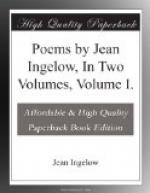“Because,—because their pilfering
had got head.
What wouldst thou more? The neighbors
pleaded hard,
’Tis true, and many tears the creature shed;
But I had vowed their prayers to disregard,
Heavily strike the first that robbed my land,
And put down thieving with a steady hand.
“She said she was not guilty. Ay, ’tis
true
She said so, but the poor are liars all.
O thou fell Fiend, what wilt thou? Must I view
Thy darkness yet, and must thy shadow
fall
Upon me miserable? I have done
No worse, no more than many a scathless one.”
“Yet,” quoth the Shade, “if ever
to thine ears
The knowledge of her blamelessness was
brought,
Or others have confessed with dying tears
The crime she suffered for, and thou hast
wrought
All reparation in thy power, and told
Into her empty hand thy brightest gold:—
“If thou hast honored her, and hast proclaimed
Her innocence and thy deplored wrong,
Still thou art nought; for thou shalt yet be blamed
In that she, feeble, came before thee
strong,
And thou, in cruel haste to deal a blow,
Because thou hadst been angered, worked her woe.
“But didst thou right her? Speak!”
The Justice sighed,
And beaded drops stood out upon his brow;
“How could I humble me,” forlorn he cried,
“To a base beggar? Nay, I will
avow
That I did ill. I will reveal the whole;
I kept that knowledge in my secret soul.”
“Hear him!” the Phantom muttered; “hear
this man,
O changeless God upon the judgment throne.”
With that, cold tremors through his pulses ran,
And lamentably he did make his moan;
While, with its arms upraised above his head,
The dim dread visitor approached his bed.
“Into these doors,” it said, “which
thou hast closed,
Daily this woman shall from henceforth
come;
Her kneeling form shall yet be interposed
Till all thy wretched hours have told
their sum;
Shall yet be interposed by day, by night,
Between thee, sinner, and the warmth and light.
“Remembrance of her want shall make thy meal
Like ashes, and thy wrong thou shalt not
right.
But what! Nay, verily, nor wealth nor weal
From henceforth shall afford thy soul
delight.
Till men shall lay thy head beneath the sod,
There shall be no deliverance, saith my God.”
“Tell me thy name,” the dreaming Justice
cried;
“By what appointment dost thou doom
me thus?”
“’Tis well that thou shouldst know me,”
it replied,
“For mine thou art, and nought shall
sever us;
From thine own lips and life I draw my force:
The name thy nation give me is REMORSE.”
This when he heard, the dreaming man cried out,
And woke affrighted; and a crimson glow
The dying ember shed. Within, without,
In eddying rings the silence seemed to
flow;
The wind had lulled, and on his forehead shone
The last low gleam; he was indeed alone.




